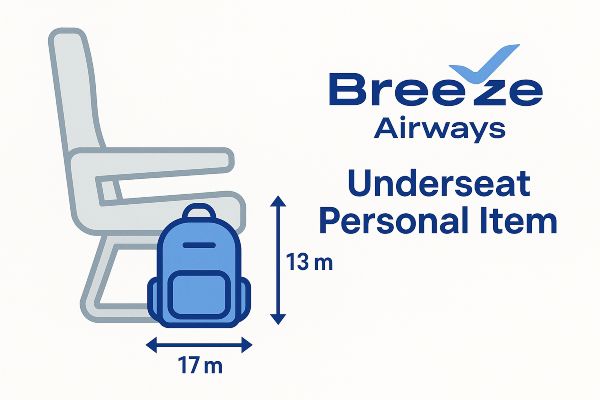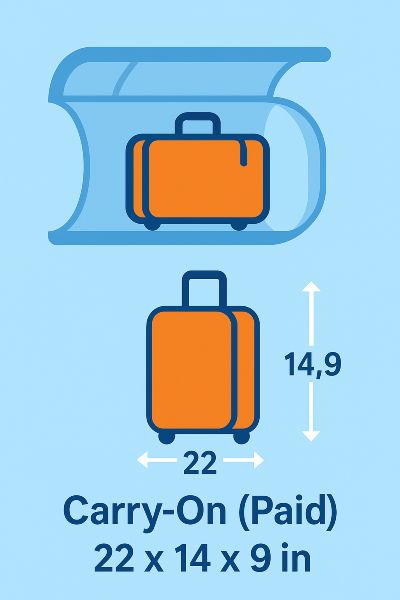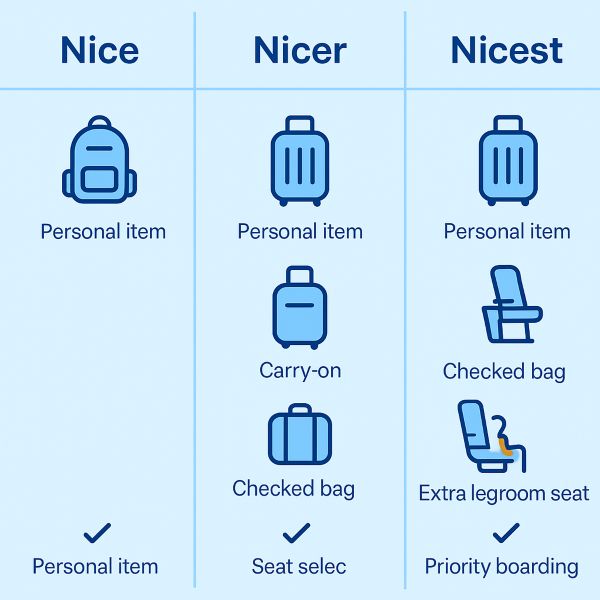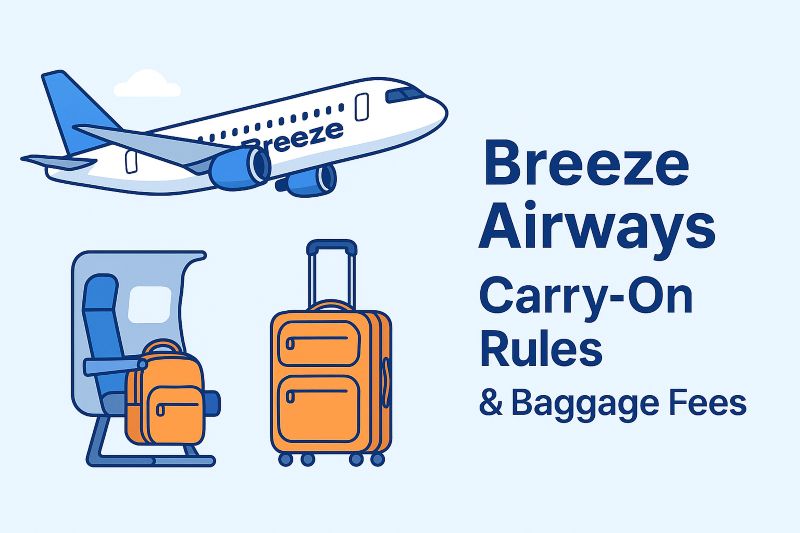If you haven’t flown Breeze Airways yet, you might have at least heard of it. Breeze is one of the newest low-cost airlines in the U.S., launched in 2021 by the founder of JetBlue. Their idea is simple: connect smaller cities that usually don’t get nonstop flights and keep fares affordable. Sounds good, right? Well, like most budget airlines, there’s a catch when it comes to baggage.
Breeze doesn’t automatically include a free carry-on bag with your ticket. Instead, the airline lets you bring one personal item for free, but anything bigger goes into the “paid baggage” category. That’s why it’s super important to know the size rules and fees before you head to the airport — otherwise, you could end up paying more than you expected.
In this guide, I’ll break down everything you need to know about Breeze Airways’ carry-on and baggage policy: what you can bring for free, what you’ll pay for a carry-on or checked bag, and how to save money on those fees. By the end, you’ll be able to pack smart and avoid any airport surprises.
Personal Item Policy
Breeze Airways does allow one free personal item for every passenger, no matter what type of ticket you book. That’s the one piece of baggage you don’t have to worry about paying extra for.
The catch? It has to fit under the seat in front of you. Breeze’s maximum size for a personal item is 17 x 13 x 8 inches. If your bag is even slightly bigger and can’t slide all the way under the seat, the gate agents may tag it as a carry-on, which means you’ll end up paying the carry-on fee right there on the spot (and yes, that’s usually more expensive than prepaying online).

Good examples of personal items that work on Breeze:
-
A small backpack
-
A laptop bag
-
A purse or tote bag
-
A diaper bag if you’re traveling with a baby
If you’re trying to travel super cheap, this is where you can save money. Packing light and sticking to just the personal item means you’ll avoid all baggage fees — a great option for short weekend trips.
Carry-On Bag Policy
Here’s the part that usually trips people up: carry-on bags are not free on Breeze Airways. If you want to bring a roller suitcase or anything that goes in the overhead bin, you’ll need to pay for it.

Carry-On Size Rules:
-
Maximum size: 22 x 14 x 9 inches
-
Weight: Breeze doesn’t publish a strict weight limit, but you must be able to lift it yourself into the overhead bin.
Carry-On Fees:
-
When purchased at booking: usually $35–$45 each way
-
At check-in or at the airport: higher (often $50 or more)
-
At the gate: the most expensive, and you may pay an extra handling fee on top
So if you’re planning to bring a carry-on, do yourself a favor and add it while you’re booking your ticket. Waiting until later almost always means paying more.
Pro tip: Breeze has fare bundles called Nice, Nicer, Nicest. If you know you’ll be bringing a carry-on, sometimes upgrading to “Nicer” actually costs less than paying for the bag separately — and you get extra perks included.
Checked Bag Policy
If you’re planning on checking a bag with Breeze, here’s what you need to know.
Checked Bag Size & Weight Rules:
-
Maximum size: 62 linear inches (that’s length + width + height)
-
Maximum weight: 50 pounds (22.7 kg)
-
Bags over this limit will get hit with overweight or oversize fees (more on that in a minute).
Checked Bag Fees (each way):
-
At booking: usually $39–$45 for the first checked bag
-
At check-in or airport: often $50+
-
Additional bags: cost more (second bag usually around $50–$60)
Overweight & Oversize Fees:
-
51–70 lbs: + $50
-
71–99 lbs: + $100
-
Oversize (63–80 linear inches): + $75
-
Bags 100 lbs+ or over 80 inches are not accepted
In short: if you know you’ll be checking a bag, the cheapest move is to add it online when you book your flight. Wait until you’re at the airport, and you’ll almost always pay more.
Infant, Stroller, and Special Items
Traveling with kids or special equipment? Breeze has a few helpful allowances that can save you some stress.
-
Strollers & Car Seats: If you’re flying with a baby or toddler, you can bring one stroller and one car seat for free. These don’t count against your baggage allowance and can either be checked at the ticket counter or gate-checked before boarding.
-
Diaper Bags: If you’re traveling with an infant, a diaper bag is allowed in addition to your personal item. That means parents basically get one extra small bag for free.
-
Mobility Devices: Items like wheelchairs, walkers, and medical equipment are also free of charge and not counted toward your baggage limit.
-
Sports Equipment: Most sports gear (like golf clubs or skis) is accepted, but it’s usually treated as a checked bag. That means you’ll pay the standard checked bag fee, plus any applicable overweight or oversize charges.
So while Breeze is pretty strict about personal items and carry-ons, families and travelers with mobility needs still have a little breathing room when it comes to what they can bring.
Breeze Airways Bundle Options: Nice, Nicer, Nicest

One thing that makes Breeze a little different from other low-cost airlines is their bundle system. Instead of just selling you a bare-bones ticket and tacking on every fee later, they let you pick from three bundle levels:
-
Nice (Basic Fare):
-
Cheapest ticket
-
Includes only one free personal item
-
Carry-on and checked bags cost extra
-
-
Nicer:
-
Includes one carry-on bag
-
Includes one checked bag
-
Lets you pick a standard seat
-
Often the better deal if you know you’ll need both a carry-on and a checked bag
-
-
Nicest:
-
Includes one carry-on and two checked bags
-
Extra legroom seat selection
-
Priority boarding
-
Refundable ticket option
-
Great if you’re bringing lots of luggage or want flexibility
-
👉 The trick here is to actually compare the bundle prices to what you’d pay buying baggage separately. Many times, upgrading to Nicer ends up cheaper than sticking with Nice and adding a carry-on + checked bag later.
Tips to Save Money on Breeze Baggage
Breeze keeps base fares low, but baggage fees can sneak up on you if you’re not careful. Here are a few smart ways to keep costs down:
-
Buy bags at booking – this is always the cheapest time. Waiting until check-in or the airport will cost you more.
-
Consider the bundles – upgrading to Nicer or Nicest can sometimes be cheaper than buying a carry-on and checked bag separately.
-
Travel light with just a personal item – if you’re on a short trip, sticking to the free 17 x 13 x 8 in personal item saves the most.
-
Share checked bags – if you’re traveling as a couple or family, instead of each person buying a bag, combine items into fewer checked bags.
-
Weigh your luggage at home – overweight fees add up fast. Keeping your bag under 50 lbs means you avoid surprise charges.
A little planning before you fly can save you anywhere from $20 to $100 per trip — money that’s better spent at your destination than at the airport counter.
Comparison With Other Budget Airlines
Breeze Airways might be new to the game, but its baggage rules line up pretty closely with other low-cost airlines. The biggest difference is how they package things into their Nice, Nicer, Nicest bundles, while airlines like Spirit or Frontier just charge for each bag separately.
Here’s a quick side-by-side look:
| Airline | Free Personal Item | Free Carry-On | First Checked Bag | Bundle/Upgrade Option |
|---|---|---|---|---|
| Breeze | ✅ Yes (17x13x8 in) | ❌ No | ❌ No | Yes – Nicer/Nicest bundles include bags |
| Spirit | ✅ Yes | ❌ No | ❌ No | Bundle available (Bundle It, Freedom Flex) |
| Frontier | ✅ Yes | ❌ No | ❌ No | WORKS / PERKS bundles include bags |
| Allegiant | ✅ Yes | ❌ No | ❌ No | Trip Flex & bundles may include bags |
Bottom line: Breeze isn’t more generous than Spirit or Frontier — but its bundle system can make it easier to predict your total cost, and sometimes ends up being a better deal if you’re traveling with more than one bag.
Recommended Luggage for Breeze Airways
Since Breeze is strict on sizes, the smartest move is to use luggage that’s guaranteed to fit their rules. Here are a few picks that match their dimensions perfectly and get excellent reviews:
🎒 Best Personal Item Bag (17 x 13 x 8 in)
Samsonite Tectonic Lifestyle Crossfire Business Backpack
-
Compact size that fits under the seat
-
Padded laptop sleeve
-
Comfortable straps for easy carrying
Pros: Lightweight, durable, sleek design
Cons: Too small for longer trips
🧳 Best Carry-On Bag (22 x 14 x 9 in)
Travelpro Maxlite 5 Expandable Spinner
-
Meets Breeze’s carry-on limits
-
Ultra-lightweight (5.4 lbs)
-
Four smooth spinner wheels
Pros: Reliable, easy to maneuver, fits overhead perfectly
Cons: Fabric material may scuff if handled roughly
🛄 Best Checked Bag (62 linear in)
Samsonite Winfield 3 Hardside Luggage
-
28” version fits just under the 62 linear inch rule
-
Durable polycarbonate shell
-
TSA-approved lock
Pros: Tough and protective, great capacity
Cons: Heavier than fabric bags
Pro Tip: Always double-check your luggage size before buying. Breeze agents are strict about dimensions — even an extra inch can mean extra fees.
Conclusion
Flying with Breeze Airways can be a great deal if you know how their baggage system works. The airline’s low fares look tempting, but remember that carry-on and checked bags are not included in the base “Nice” ticket. You’ll only get one free personal item unless you pay for more or upgrade to a higher bundle.
The good news is Breeze gives you options. If you travel light with just a backpack, you’ll save the most money. If you need more luggage, buying your bags at booking — or choosing the Nicer or Nicest bundle — usually ends up cheaper than adding bags later.
Bottom line: plan your baggage before you book. Breeze is strict on sizes, but once you understand the rules and pack smart, you’ll avoid surprise fees and enjoy a smooth, affordable trip.

Horace Dupuy is a seasoned traveler and luggage reviewer who has spent years flying with both major and regional airlines across the United States and abroad. His first-hand travel experience has taught him exactly what works (and what doesn’t) when it comes to carry-on rules, baggage fees, and packing strategies.
At CarryOnSizes.com, Horace combines personal travel knowledge with in-depth research to provide accurate, up-to-date guides for travelers who want to fly stress-free. When he is not writing about luggage, you will probably find him exploring new destinations with only a compact backpack in tow.
